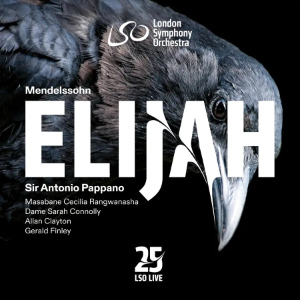
Felix Mendelssohn (1809-1847)
Elijah, Op 70, MWV A25 (1856-46)
Masabane Cecilia Rangwanasha (soprano); Dame Sarah Connolly (mezzo-soprano); Allan Clayton (tenor); Gerald Finley (bass); Ewan Christian (treble)
London Symphony Chorus, The Guildhall Singers
London Symphony Orchestra/Sir Antonio Pappano
rec. live, 28 & 31 January 2024, Barbican Hall, London
Text included
LSO Live LSO0898 SACD [2 discs: 121]
This LSO Live release was previously very favourably reviewed and designated as both a “Recommended” recording and a “Recording of the Month” by my colleague John Quinn; I refer you to his review for some useful background information and commentary on the textual changes employed here, which it would be superfluous to repeat. He mentions in passing my own point of comparison: Paul Daniel’s recording with Bryn Terfel and Renée Fleming, made as long ago as 1996.
We first immediately hear Elijah’s prophetic admonition. Both the young Bryn Terfel and the more seasoned Gerald Finley here are enormous assets to their respective recordings: Terfel has a meatier, heftier sound and Finley the slimmer, darker, more intrinsically noble tone and preference will be entirely personal; I, for one, prefer Finley – but be that as it may. “Lord God of Abraham” is one of the highlights and both Terfel and Finley sing it beautifully and movingly. The heft of Terfel’s bass-baritone perhaps gives him the advantage in the contrasting “Is not his word like a fire” but both singers despatch the coloratura with elan. Finley really comes into his own with “It is enough”; his legato is ravishing.
The LSO is obviously a modern orchestra producing a smoother sound than Daniel’s rawer, period-instrument Orchestra of the Age of Enlightenment but eschews any exaggerated Romanticism; again, partiality for one over the other will be subjective. Both choirs are entirely committed, robust and sensitive by turns; they really cannot be faulted. Both conductors are admirable, although Pappano’s long experience with opera permits him to gain the dramatic edge.
The other soloists in both recordings are excellent but Daniel’s John Mark Ainsley is sweeter voiced than the perfectly pleasant Allan Clayton. Dame Sarah Connolly’s vibrato has considerably loosened of late compared with Patricia Bardon’s steadier mezzo-soprano and she is sounding…mature; “O rest in the Lord” borders on the wobbly – but she sings with dignity and gravitas. Both recordings have star sopranos in Renée Fleming and Masabane Cecilia Rangwanasha; the latter has a large, brilliant, vibrant sound with a slightly pulsing vibrato, whereas Fleming is smokier and more expressively nuanced. Both sing their big number “Hear ye, Israel!” with surpassing beauty – although Fleming’s diction is somewhat more intelligible. The vocal quartets and a cappella angelic Trio sung by the Guildhall Singers are exquisitely intoned but the solo treble’s diction, too, could be more distinct; I find his words to be indecipherable, whereas for Daniels, Matthew Munro – who would by now be pushing forty – is much clearer and purer voiced.
Presumably this was a composite recording derived from the two performances. The balances and dynamics of the sound are impeccable; I could hear nothing to indicate that this was a live recording beyond the perceptible animation of the occasion.
If you already own the earlier Decca recording, unless you specifically want the artists featured in this new issue, there is no need to rush to replace or supplement that older account. Differences between them are really minimal and both are entirely satisfactory – indeed, with the exception of Finley’s majestic Elijah, my own loyalties remain marginally with Daniels’ soloists even though I concede the energy of Pappano’s direction.
Ralph Moore
Previous review by John Quinn (October 2024)
Buying this recording via a link below generates revenue for MWI and helps us keep free access to the site



















